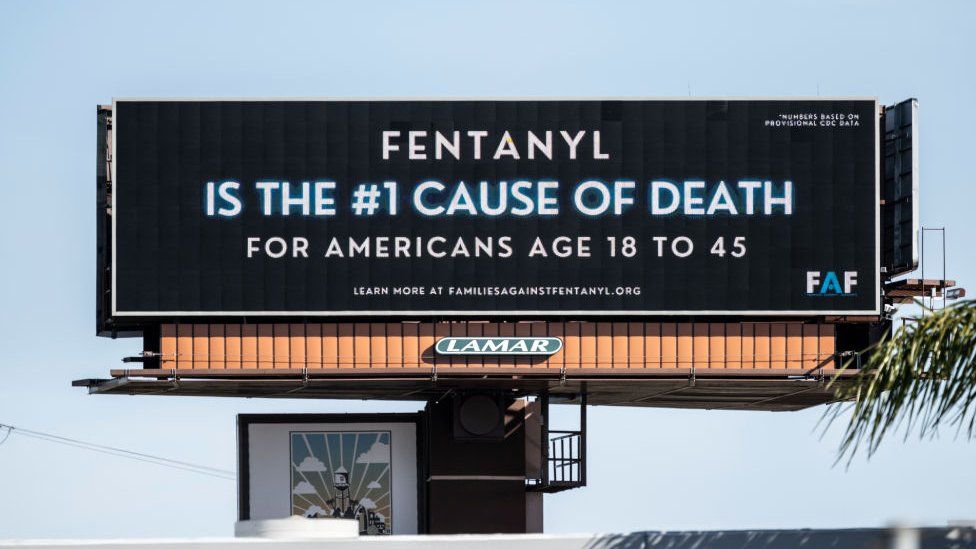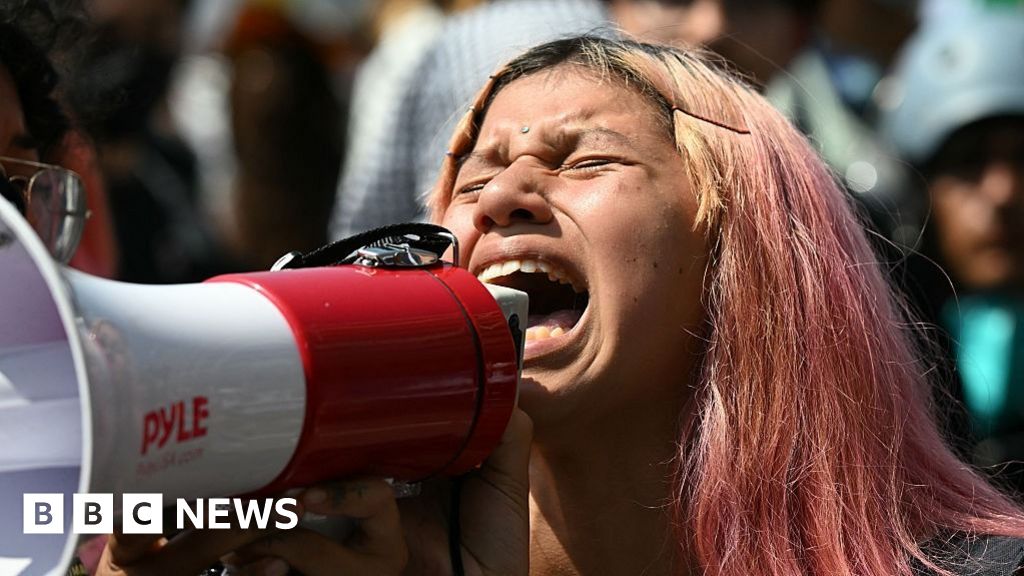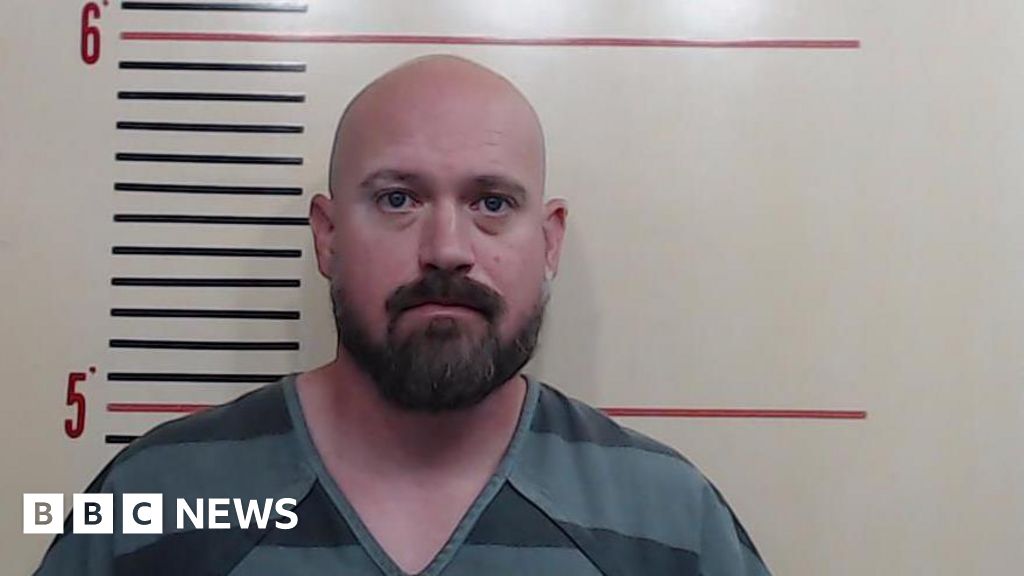ARTICLE AD BOX
 Image source, Getty Images
Image source, Getty Images
Fentanyl contributed to the deaths of 75,000 Americans last year.
By Bernd Debusmann Jr
BBC News, Washington
Fentanyl is a leading killer in the US - contributing to 75,000 deaths last year - and the heat is on President Joe Biden to do something.
He laid out plans on Tuesday to tackle "every angle" of the fentanyl crisis, calling it an "American tragedy".
Many angles, though, involve China and Mexico, which lay beyond US control.
And China's pledge to crack down on supplying Mexican cartels with chemicals used to make fentanyl may not be enough.
"Curbing this crisis is something every American can get behind," Mr Biden said at a White House meeting on Tuesday. "It's tough stuff. People are dying".
He laid out the many parts of his approach to the crisis, including expanded access to treatment and "strong international cooperation", while flanked by the country's top diplomat, Secretary of State Anthony Blinken, and its most powerful prosecutor, Attorney General Merrick Garland.
Image source, Getty Images
Image caption,President Joe Biden described his plan at a White House meeting a week after meeting with China's Xi Jinping.
Mr Biden also said the deal he reached last week with Chinese President Xi Jinping on limiting the export of certain chemicals from China is "critical" in stopping the flow of fentanyl into the US.
Chemicals used to make the powerful opioid flow "unabated" from China to Mexico, according to a report released by from the US Commission on Combating Synthetic Opioids in February, and China's chemical firms remain the "primary sources" of substances used to produce fentanyl.
In the past, US officials have cautioned that while Chinese counter-narcotics policy is set by the central government in Beijing, enforcement is often in the hands of provincial authorities that may lack the necessary resources, or, in some cases, be susceptible to corruption.
Thomas Bollyky, a former US trade official and veteran of negotiations with China, told the BBC that the central government is "capable" of effectively cracking down on chemical firms involved in the fentanyl trade. The bigger question is if "it's a sufficient priority."
"Whether that's the case really has to do with broader geopolitical dynamics," Mr Bollyky added. "China has been clear that China itself does not have a fentanyl problem. They see these issues as part of the broader strategic dialogue with the US".
Image source, Getty Images
Image caption,Joe Biden says that the US will 'verify' that China is taking action against firms that produce fentanyl precursor chemicals.
President Biden said that the US will "verify" that China is holding to the agreement.
One of the synthetic opioid commission's co-chairs, Maryland Democrat David Trone - whose son Ian died of a fentanyl overdose in 2016 - said last week that the deal between Mr Biden and Xi Jinping was "worth commending" and "welcome news".
"But, it represents just one step in a long journey to end this vicious drug epidemic," he added.
Those vying to replace Mr Biden in 2024 are focused more on Mexico than China.
Several Republican presidential candidates have publicly endorsed using force against fentanyl traffickers and laboratories, without providing exact details of how they would identify people or sites to attack in the often diffuse process of making and moving the drug.
Florida Governor Ron DeSantis, for example, has vowed to send US special forces into Mexico on "day one" of his administration if elected.
Former President Donald Trump vowed to "inflict maximum damage" on cartels using special forces, cyber war and "other overt and covert actions".
Mexican president Andrés Manuel López Obrador has called the suggestions "extravagant nonsense" aimed at gaining "sympathy" among voters.
His government has largely shrugged off suggestions that it is partially responsible for America's fentanyl problem.
Arturo Sarukhán, Mexico's former ambassador in Washington DC, said that rising fentanyl deaths have "turbocharged" an aggressive narrative towards Mexico in US politics, which could ultimately have "dire consequences" for the relationship between the two countries.
"The fact that all roads to the Republican primary now lead to the border and the piñata-bashing of Mexico is a sign of the trouble ahead," he said. "Particularly when Mexico has become the number one trading partner of the US, the largest buyer of US exports in the world and a key player in Washington's successful recalibration of ties vis-à-vis China."
Image source, Getty Images
Image caption,Painted stones in memory of someo the thousands of Americans who have died from fentanyl are laid out in New York on fentanyl awareness day in May.
Limiting supply of the drug alone will not solve the crisis, said Professor Alexandra Punch, a public health expert at Syracuse University who focuses on drug policy, adding the US must also address reducing the drug's harm.
She pointed to "safe consumption" or overdose prevention centres similar to those found in countries such as Canada, which, she said, have proven "successful at decreasing mortality, decreasing HIV rates and also decreasing drug-related crime in the vicinity of where they're located".
"What we're looking to solve is the mortality issue," she said. "I don't think we're going to solve the demand issue, because people are just going to find something different to use."
Expert: Fentanyl crisis has ‘only gotten worse’

 1 year ago
37
1 year ago
37








 English (US) ·
English (US) ·